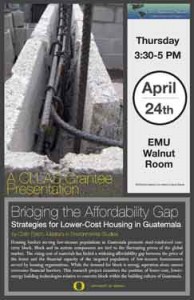 Erb Memorial Union
Erb Memorial Union
Walnut Room
1222 E. 13th
CLLAS Graduate Research Grantee presentation
by Collin Easton, Master’s in Environmental Studies
Among the designs currently promoted by housing lenders serving low-income populations in Guatemala, there is a preference for steel-reinforced concrete block. These designs respond to the high demand for block homes on the part of aspiring home-owners across a broad income range. A commodity itself, block and its system components are tied to the fluctuating prices of the global market. The rising cost of materials has fueled a widening affordability gap between the price of the home and the financial capacity of the targeted population of low-income homeowners served by housing organizations.
This research project examines the position of lower-cost, lower-energy building technologies relative to concrete block within the building culture of Guatemala. While the demand for block is strong, aspiration alone cannot overcome financial barriers. There are also some characteristics of the pre-block systems such as wood, adobe and bajareque which homeowners value over block. These include cost, thermal performance, quality-control—and in the case of bajareque—seismic performance. Strategies that seek to make housing safer and more affordable would be greatly enhanced by better incorporating the contributions traditional building systems have made to the culture of building in Guatemala lest the baby be thrown out with the bathwater.
Findings draw from qualitative focus-group interviews with homeowners in four departments, one-on-one interviews with housing practitioners serving low-income Guatemalans, and over 200 survey interviews conducted between July and September of 2013.
